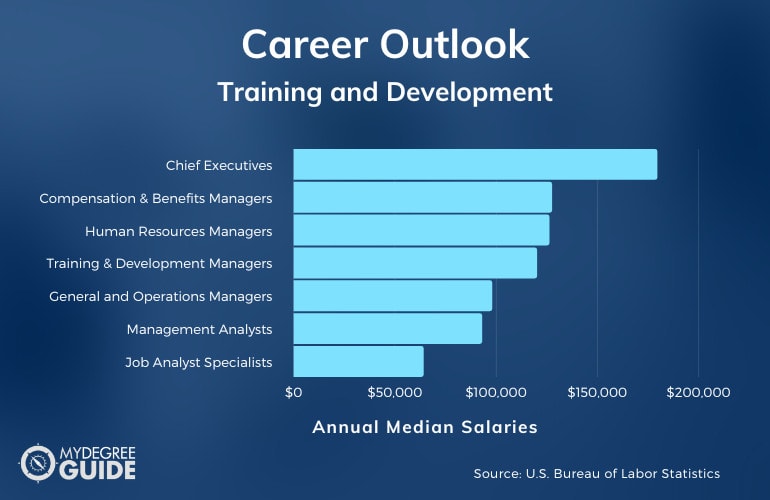When you’re ready for the next step in your workplace learning career, you might consider earning a masters in training and development.

This graduate degree can equip you to plan, lead, and evaluate instructional programs for employees. Your efforts can help employers build dedicated, empowered teams of people who do their jobs well and feel fulfilled in their roles.
Editorial Listing ShortCode:
Whether you want to improve at creating training materials or leading development departments, a master’s degree in workplace education could help you advance in this field.
Online Masters in Training and Development Degree Programs

Are you interested in helping employees do their best work? Does exploring theories about motivation, cognition, and memory fascinate you? Are you interested in using technology for increasingly effective workplace training? If so, then an online masters degree in training and development could be a good fit for you.
Development programs are beneficial for both employees and employers. Workers who receive consistent, worthwhile training are more likely to be satisfied in their jobs. Then, organizations benefit from long-term employees who do their work well.
As a result, experts in the training and development field are in demand. Organizations are in search of people who know how to deliver effective adult education that makes a real difference in workplace outcomes. To fill the need, you can earn a masters in learning and development degree.
In your program, you can study learning theories, instructional design, and program evaluation. Other topics might include motivation and communication. In today’s programs, e-learning is a major emphasis as well. You could also learn to coach others and provide consulting services.
Editorial Listing ShortCode:
A training and development master’s degree comes in several different forms. The options vary among schools, but you might decide to earn a:
- Master of Science (MS) in Training and Development
- Master of Arts (MA) in Training and Development
- Master of Business Administration (MBA) in Human Resource Management
- Master of Education (MEd) in Workforce Development
Depending on the design of your program, you might be able to pick a concentration for your studies. Examples include human resources or organizational leadership.
These master’s degree programs often end with capstone projects. The final project is a way to demonstrate your grasp of the principles you’ve learned throughout your graduate studies. Sometimes, these projects entail practicum or research aspects. Earning this master’s degree can help qualify you for various leadership roles in an organization.
Potential job titles in this sector include e-learning coordinator, training and development manager, and chief learning officer. Some professionals also work as a leadership coach or a training consultant.
5 Things You Can Do with a Training and Development Masters Degree

Training and development graduate studies could open the door to many different opportunities, as training and development is in demand throughout a variety of industries.
No matter your job title, you might find yourself working in a finance, business, nonprofit, or healthcare organization. Different organizations use different job titles, but the list below can give you an idea of the sort of roles that are common in the field.
1. Instructional Program Developer
There are many types of training and development specialists, and a program developer is one of them. Program developers come up with the training resources that employees use. That can include both the overall teaching approach, the scope of the program, and the individual modules.
Today, many instructional programs are technology-based, so program developers often focus on creating e-learning platforms that are effective and engaging.
2. Training and Development Manager

Training and development initiatives are often overseen by management personnel. A company’s learning manager may be responsible for selecting training materials and evaluating program effectiveness.
Other important responsibilities of training and development managers include coordinating team members and maintaining communication with other departments. Some managers deliver training modules themselves, but most work in a more supervisory capacity.
3. Chief Learning Officer
In some organizations, the top official in charge of training and development programs holds the title of chief learning officer (CLO). This person is usually part of the C-suite of company executives.
The CLO might make final decisions about training initiatives and set the budget for the department. Another key responsibility is making sure that employee development remains one of the organization’s top priorities.
4. Executive Coach

Those who want to help business leaders achieve their full potential could choose to become executive coaches. Clients hire coaches to encourage their growth as leaders.
Executive coaches conduct assessments and ask probing questions that allow their clients to learn more about themselves, their strengths, and the areas where they need more growth. The process often helps professionals reach goals, manage stress, communicate effectively, or earn job promotions.
5. Training Consultant
Often, organizations call on outside specialists to bolster their training programs. Training consultants evaluate a company’s learning initiatives and identify areas for improvement.
Editorial Listing ShortCode:
As part of the process, they may even create new training materials or programs to meet the needs they’ve identified. In addition, organizations may hire consultants to deliver educational presentations to their team members.
Common Training and Development Master’s Concentrations

When you earn an MA or an MS in Training and Development, you may be able to select a concentration for your degree. With a concentration track, you’ll take several classes centered around a particular subfield.
Common training and development concentrations include:
- Consulting. In this track, you can prepare to serve as an external consultant who effectively communicates improvement strategies. You might also study how to identify, attract, and interact with clients.
- Executive Coaching. An emphasis on leadership coaching can help you develop skills for listening to clients, asking effective questions, and evaluating others’ progress. This track should include plenty of practice opportunities.
- Human Resources Leadership. For a leadership role in a human resources department, you can study how training and development fits into an overall HR picture. You might also learn about hiring, conflict resolution, and compensation.
- Online Instruction. With a focus on technology, this track could be a good fit for anyone who wants to deliver digital instruction. You’ll discuss ways to implement training and track employees’ growth.
- Training Management. If you have your eyes on a top spot in the training and development department, then you may appreciate this concentration’s management focus. The topics covered will likely include budgeting, change management, and marketing.
Different colleges offer different concentrations. If there’s a particular track that interests you, you may want to factor that into your college shopping process.
Training and Development Careers & Salaries

Professionals with a graduate degree in training and development tend to go into the talent training department of an organization. While most initially work as specialists, there could be the potential for growth into management roles.
Talent and development professionals go by various names, depending on the organization. Examples include training director, e-learning coordinator, development manager, or senior learning services leader. Talent and development is closely associated with human resources practices, so others can also hold an HR title, such as HR specialist or HR manager.
Compensation and benefits is another branch of HR, and coordinating benefits packages can be another way to help organizations attract and retain top talent. According to the Bureau of Labor Statistics, management positions pay a median annual salary of $102,450, and they’re growing at a 9% rate over the next ten years.
| Careers | Annual Median Salaries |
| Chief Executives | $179,520 |
| Compensation and Benefits Managers | $127,530 |
| Human Resources Managers | $126,230 |
| Training and Development Managers | $120,130 |
| General and Operations Managers | $97,970 |
| Management Analysts | $93,000 |
| Compensation, Benefits, and Job Analysis Specialists | $64,120 |
| Instructional Coordinators | $63,740 |
| Human Resources Specialists | $62,290 |
| Training and Development Specialists | $61,570 |
Management roles often go to people with graduate-level educations. In addition to being an HR manager, compensation manager, or development director, professionals could also hold a less specialized title.
For example, in a smaller organization, the general manager position might benefit from a leader with a training and development background. Or, in a larger organization, rising to one of the very top positions might be a possibility. For example, some companies hire talent and development experts for the role of chief learning officer.
Editorial Listing ShortCode:
Instead of working inside an organization, some professionals are called upon as outside experts to help with employee growth and development. Management analysts or consultants provide insight into ways for companies to improve their team members’ knowledge and efficiency.
Being an executive coach might be similar, but this role works one-on-one with individual clients. Executive coaches can guide people through developing as leaders and achieving professional goals.
Training and Development Master’s Curriculum & Courses

Before committing to a master’s degree program, you may want to take a look at the curriculum to see what classes jump out at you. Taking interesting classes that are relevant to your chosen profession is a key component of a satisfying grad school experience.
Here are some typical courses for a masters in training and development program:
- Coaching Strategies: As you learn how to provide coaching services, you may read case studies and engage in practice sessions.
- Consultation Services: This class can help equip you with skills for evaluating an organization’s training plan and suggesting interventions.
- Designing Systems of Instruction: In one or more classes, you’ll study how to develop training programs that communicate clear messages, meet your learners’ needs, and accommodate your budget.
- Evaluation of Training Programs: Once you put a learning system into place, you can use the strategies learned in this course to evaluate how well it’s working.
- Learning Theories: The latest research in cognition, memory, and motivation may underpin your work in the training and development field.
- Portfolio Development: To prepare you for job interviews and career advancement, this class may guide you through the process of developing a professional portfolio that showcases your work.
- Strategic Training: In this course, you’ll discuss what it means to align your training style and frequency to your organization’s overall goals.
- Teaching Technology: This course provides a detailed overview of gamification, social media messaging, self-paced modules, and other tech-based approaches to employee training.
- Understanding E-Learning: Since so many training programs are delivered digitally these days, it’s important to study how to design and implement computer-based learning.
- Workplace Learning: This class provides a foundational overview of factors involved in providing meaningful instruction to adult learners.
While the requirements vary among different schools, it’s common for master’s degrees in training and development to require at least 36 credit hours.
How to Choose an Online Masters in Training and Development Program

As you think about where to get your master’s degree, considering these factors may help you narrow down your choice of school.
- Accreditation. Regional accreditation is the gold standard for colleges. To ensure you’re going to get a high-quality education, you might want to choose a school that holds this distinction.
- Certificate option. Before committing to a full degree program, you may want to test the waters by earning a certificate. If so, you can look for a school where the certificate coursework is transferrable into the full degree program.
- Class schedule. As a busy professional, you may want to choose an academic calendar that fits your life. For many working students, that often means online classes that last just 6 to 8 weeks each.
- Concentrations. If you already have a training and development career goal in mind, you might want a degree concentration to match. For example, some schools offer concentration tracks for those interested in coaching, consulting, or instructional design roles.
- Degree type. Do you want to earn an MBA in Training and Development, or would you prefer an MS or MA in Training Development? An MBA will have more general business courses, and an MS or MA will likely spend more time focused directly on workplace education.
- Technology focus. Many companies today are relying on digital approaches to training their team members. If you’re interested in this topic, you can look for a program with multiple courses about technology and e-learning.
- Transfer policies. If you’ve been to grad school before, you may have coursework that can count for credit in a new program. You can take a look at prospective schools’ rules surrounding transfer credit to see how much time and money you might be able to save.
You might have additional priorities that will factor into your school decision as well.
Admissions Requirements

Grad school admissions can be competitive, so it’s beneficial to put your best foot forward during the application process. There will probably be a form to fill out and submit along with a fee. Other common application requirements include:
- GRE or GMAT scores (not required at all colleges)
- Purpose statement that outlines why you want this degree
- Reference letters from professional supervisors
- Bachelor’s transcript and possible minimum GPA
Many colleges recommend applying well in advance of your chosen start date, so it’s helpful to start early and to pay attention to deadlines.
Accreditation

Whether you enroll in business school or another type of graduate program, you can check the US Department of Education’s website to ensure that your college holds regional accreditation. If it does, you can count on getting a decent education there.
Regional accreditation is granted only to schools that undergo a robust evaluation process and meet or exceed educational standards. Accreditation can provide you peace of mind about the quality of the instruction that you’ll receive.
Editorial Listing ShortCode:
Regional accreditation is also widely recognized by others. If you decide to transfer schools or to apply for an on-campus or an online PhD in Training and Development, your new institution will check whether your previous studies were accredited. Employers, too, appreciate and often prefer accredited degrees.
Training and Development Licensure and Certifications

Industry certifications can look good on your resume. Not only are they a way to demonstrate your expertise, but they can also enhance your know-how. The Association for Talent Development (ATD) offers two certification options.
With three years of experience, you can pursue the Associate Professional in Talent Development (APTD) credential. Five years’ experience could qualify you for the Certified Professional in Talent Development (CPTD). Another certification is the Certified Professional in Training Management (CPTM) from Training Industry.
For general HR programs, you may want to look into SHRM Certified Professional (SHRM-CP) or SHRM Senior Certified Professional (SHRM-SCP). These certifications are awarded by the Society for Human Resource Management (SHRM).
Financial Aid and Scholarships

If you’re ready to earn a training and development master’s degree, then it may be time to fill out the Free Application for Federal Student Aid (FAFSA).
Most of your financial aid offers will be based on your FAFSA information. Graduate students often qualify for state and federal loans. Grants are less common for people in master’s degree programs. Fortunately, scholarships and fellowships are an alternative option for some students. Your college might offer you some of these financial gifts, or you might win such awards from outside sources.
For example, professional organizations and special-interest clubs often run scholarship programs. Your employer could be another source of financial support. Many workplaces offer incentives for team members to further their education. Especially if you already work in HR or talent development, your employer could benefit from your advanced learning.
Training and Development Professional Organizations

Going after a master’s degree shows that you want to develop your expertise as a training and development professional. Joining a professional association is another step that you can take toward success and involvement in the industry.
Here are common organizations for this field:
- Association for Talent Development (ATD)
- International Association for Human Resource Information Management (IHRIM)
- Society for Human Resource Management (SHRM)
Membership in these organizations often comes with a host of benefits for professional development. For one thing, joining an organization can be strategic for networking. In addition, you may receive access to online resource libraries, job boards, expert advice, newsletters, webinars, professional discounts, and more.
Should I Get a Master’s Degree in Training and Development?

Learning and development is a growing field, and you may see yourself playing a role in it. As a talent development professional, you could have the satisfaction of knowing that you’ve contributed to an organization’s success. Effective training keeps employees engaged in and committed to their work.
Editorial Listing ShortCode:
There could be long-lasting benefits for this type of job, too. While the median salary for training and development specialists is $61,570 per year, data from the Bureau of Labor Statistics shows that some managers in the field make over $207,420 annually. A master’s degree might help qualify you for senior or leadership roles.
What Can I Do with a Training and Development Masters Degree?
People with this graduate degree often hold jobs with “training” or “learning” in the title. According to the Bureau of Labor Statistics, training and development specialists could be instructors or program designers.
Experience and education could also help qualify you for management roles, such as training coordinator, learning director, or senior development leader. Other management positions could be available to training and development experts as well. For example, some work as an organization’s human resources manager or general manager. Others even advance to executive positions, such as chief learning officer (CLO).
Is Training and Development a Good Career?

Yes, training and development is a good career for many professionals. Employee learning initiatives are important for many different organizations.
Whether you’d like to work in healthcare, education, or business, this degree program could help you achieve that goal. Plus, you may find opportunities for advancement along the way. Training and development careers also tend to pay above-average salaries.
According to the Bureau of Labor Statistics, salaries for training and development specialists usually range from $31,340 to $103,240. For training and development managers, the typical range is $64,370 to $207,420.
How Long Does It Take to Get a Masters in Training and Development Online?

Traditionally, it takes about 2 years to earn a master’s degree on a college campus, depending on the length of the program. Today, online programs are shaking up the norm.
Through online study, you may be able to complete a master’s degree in training and development in about 1 year. Often, online business degree programs feature year-round coursework that’s offered during short, 8 week terms. To get done in a year, it’s often necessary to enroll full-time. If you’d prefer to spread out your studies, some colleges will let you sign up for a part-time course load instead.
What’s the Difference Between an MBA vs. Masters Degree in Training and Development?
As you look for graduate-level programs in this field, you may have the option to pursue a master’s in training and development or an MBA.
| Master of Business Administration | Masters in Training and Development |
|
|
Either degree program could help you establish a career in this field.
What’s the Difference Between a Graduate Certificate vs. Masters in Training and Development?
For graduate studies in training and development, you could pursue a certificate or a full masters degree program.
| Graduate Certificate | Master’s Degree |
|
|
Getting a certificate could be a beneficial way to explore whether graduate studies are right for you.
Is a Masters in Training and Development Worth It?

Yes, a masters in training and development is worth it for many students. Learning coordinators can make a difference in a company’s success.
Through your work, you might improve employee satisfaction and increase company productivity. Plus, this is an in-demand field with growth on the horizon. The Bureau of Labor Statistics predicts 11% job growth for both training and development specialists and managers over the next ten years.
Editorial Listing ShortCode:
Earning a master’s degree in the field might help you qualify for more senior or leadership positions, especially if it’s paired with experience and industry certifications.
Universities Offering Online Masters in Training and Development Degree Program
Methodology: The following school list is in alphabetical order. To be included, a college or university must be regionally accredited and offer degree programs online or in a hybrid format.

Amberton University offers a Master of Science in Human Resources Training and Development. The program aims to teach students how to assess learning needs, develop curriculum and evaluation systems, and apply training methodologies across various fields. Classes can be taken in person or online. The curriculum cover topics such as research methods, ethical decision making, and human resource training and management.
Amberton University is accredited by the Southern Association of Colleges and Schools.

Middle Tennessee State University offers a Master of Professional Studies in Training and Development. The program is designed for working professionals who need the flexibility of online courses to take the next step in their education. The curriculum aims to teach students how to facilitate training and professional development in the corporate environment. To graduate, students must complete 30 credits.
Middle Tennessee State University is accredited by the Southern Association of Colleges and Schools Commission on Colleges.

North Carolina State University offers a Master of Training and Development. Graduates of the program often pursue careers as trainers, program managers, or training content developers. This fully online program requires the completion of 36 credit hours. No thesis is required to qualify for graduation.
North Carolina State University is accredited by the Southern Association of Colleges and Schools Commission on Colleges.

Northwestern State University of Louisiana offers a Master of Arts in Adult Learning and Development. The program aims to teach students how to leverage data-driven research to create effective, comprehensive training and educational tools across a variety of fields.
After completing the 33 credits of core courses, students can specialize in E-learning, English Instruction, Homeland Security, or Adult and Workforce Development.
Northwestern State University of Louisiana is accredited by the Southern Association of Colleges and Schools Commission on Colleges.

Purdue University offers an online program for a Master of Science in Education – Learning Design and Technology. The program aims to teach students how to educate adult learners in professional settings and contribute to organizational success. The curriculum covers strategic assessment, human performance technology, and learning system design. Students in the program must complete 35 credits to graduate.
Purdue University is accredited by The Higher Learning Commission of the North Central Association of Colleges and Schools.

Roosevelt University offers a Master of Arts in Training and Development. Graduates of the program often secures positions in corporate training, e-learning, instructional design, and technology. This fully online program admits new students in fall, summer, and spring terms, allowing students to take the next step toward their professional goals at their earliest convenience.
Roosevelt University is accredited by the Higher Learning Commission.

Tennessee Tech University offers a Master of Professional Studies in Training and Development. The program teaches from the belief that professional training is at the core of all organizational success and aims to develop professional skills that are useful in a variety of fields. To graduate, students must complete 30 credit hours, all of which can be taken online.
Tennessee Tech University is accredited by the Southern Association of Colleges and Schools Commission on Colleges.

At the University of Georgia, students can complete their Master of Learning, Leadership, and Organization Development in a fully online format. This 2 year program balances theory and practice. It aims to provide a holistic education that empowers students in the areas of adult learning, change management, team development, coaching, and talent management.
The University of Georgia is accredited by the Southern Association of Colleges and Schools Commission on Colleges.

The University of Memphis offers a Master of Professional Studies in Training and Development. Graduates of the program often pursue careers in leadership, data reporting, instructional design, and e-learning technology. Core courses in this 33 credit program cover concepts like diversity in the workplace, human resource management, and the facilitation and evaluation of learning.
The University of Memphis is accredited by the Commission on Colleges of the Southern Association of Colleges and Schools.

The online Master of Science in Training and Development program at the University of St. Francis is designed to ensure flexibility for students while providing a comprehensive education.
Graduates of the program often become mentors, trainers, coaches, and leaders. Students can choose a concentration in Human Resource Management, Instructional Design, Management of Training and Development, Business Administration, or Health Administration.
The University of St. Francis is accredited by the Higher Learning Commission.
Getting Your Master’s in Training and Development Online

A talent development master’s degree could advance your career in workplace learning. Through your studies, you can become more knowledgeable about how to deliver meaningful content to adult learners. You can also explore the latest methods of using technology in your instructional programs.
This graduate degree can be earned online, and as an online college student, you would receive your lessons through digital formats. This in itself could be strategic for becoming well-versed in today’s instructional methods.
It’s never too early to start searching for accredited universities that offer masters in training and development programs that align with your interests.

